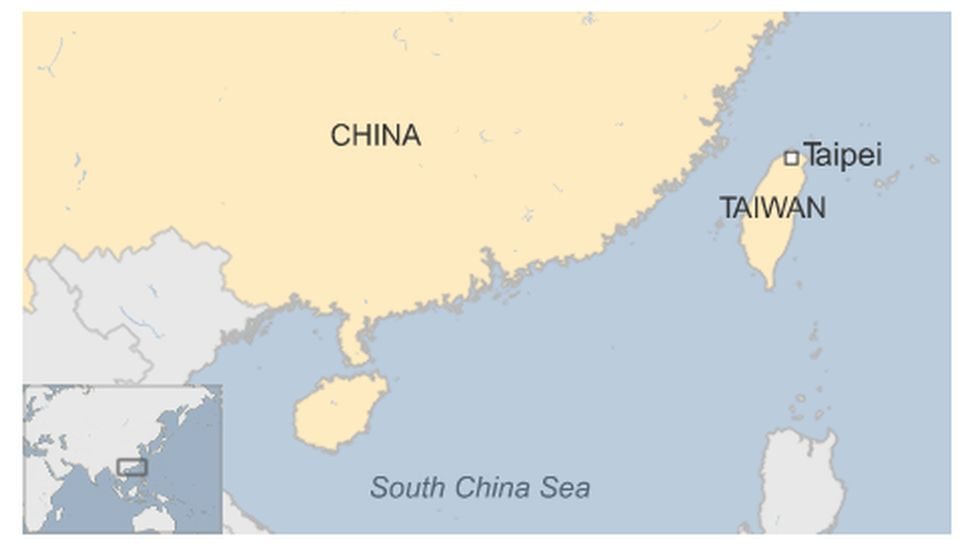International Relations
China-Taiwan Issue
- 08 Oct 2021
- 6 min read
Why in News
China-Taiwan relationship has been strained for years, but the latest escalation comes from a series of air incursions by the Chinese military.
- While a country’s airspace is internationally recognised by law, its air defence zone is a self-declared region which is monitored by the country’s military for defence purposes.
Key Points
- Conflict between China and Taiwan (Background):
- China and Taiwan separated amid civil war in 1949 and China considers Taiwan part of its territory to be taken control of by force if necessary.
- But Taiwan's leaders say that Taiwan is a sovereign state.
- After decades of hostile intentions and angry rhetoric, relations between China and Taiwan started improving in the 1980s. China put forward a formula, known as "one country, two systems", under which Taiwan would be given significant autonomy if it accepted Chinese reunification.
- In Taiwan, the offer was rejected, but the government did relax rules on visits to and investment in China.
- There were also limited talks between the two sides' unofficial representatives, though Beijing's insistence that Taiwan's Republic of China (ROC) government is illegitimate prevented government-to-government contact.
- China's implementation of a national security law in Hong Kong in 2020 was seen by many as yet another sign that Beijing was becoming significantly more assertive in the region.
- China’s Concerns:
- One China Policy Challenged:
- This means that countries seeking diplomatic relations with the People's Republic of China (PRC, Mainland China) must break official relations with the Republic of China (ROC, Taiwan) and vice versa.
- The existent diplomatic relationship of the Taiwan and its membership in intergovernmental organizations challenges this policy:
- The ROC, Taiwan has diplomatic relations with 15 countries and substantive ties with many others such as Australia, Canada, EU nations, Japan and New Zealand.
- Besides, Taiwan has full membership in 38 intergovernmental organizations and their subsidiary bodies, including the World Trade Organization, Asia-Pacific Economic Cooperation, Asian Development Bank and Central American Bank for Economic Integration.
- Agreements/Exercises Countering China:
- Recently, the US has announced a new trilateral security partnership for the Indo-Pacific, between Australia, the UK and the US (AUKUS), which is also seen as an effort to counter China.
- Malabar Exercise (US, Japan, India and Australia) is also a major step towards building a sustainable Indo-Pacific coalition thereby addressing the massive strategic imbalance generated by an economically and militarily powerful China.
- Strategic and Defense Support to Taiwan by US:
- Taiwan has sought to improve its defenses with the purchase of US weapons, including upgraded F-16 fighter jets, armed drones, rocket systems and Harpoon missiles.
- A US aircraft carrier group led by the warship Theodore Roosevelt has entered the South China Sea to ensure freedom of the seas, and build partnerships that foster maritime security.
- One China Policy Challenged:
- India’s Stand on the Issue:
- Since 1949, India has accepted the “One China” policy that accepts Taiwan and Tibet as part of China.
- However, India uses the policy to make a diplomatic point, i.e., if India believes in “One China” policy, China should also believe in a “One India” policy.
- Even though India has stopped mentioning its adherence to One China policy in joint statements and official documents since 2010, its engagement with Taiwan is still restricted due to the framework of ties with China.
- India and Taiwan do not have formal diplomatic relations but since 1995, both sides have maintained representative offices in each other’s capitals that function as de facto embassies.
Way Forward
- India and other powers must draw a redline for any Chinese effort to take Taiwan by force. After all, the Taiwan issue is not just a moral question of allowing the destruction of a successful democracy by a totalitarian State, or a question of international ethics where the principle of settling disputes peacefully is adhered to.
- In fact, the reason for drawing that line is not about Taiwan at all, but because of what the consequences of a Chinese invasion of Taiwan would be for India and the rest of Asia. The day after China’s invasion of Taiwan will mark a very different Asia, irrespective of the results of the invasion.
- Drawing a red line is not easy and may ultimately not work, but India and others at least need to try because of the stakes involved.
- One aspect of this is improving India’s ties with Taiwan, even if they stay short of recognising its independence.
- Others have argued for continuing with the growing economic relations and building on popular support for Taiwan in the wake of India’s troubles with China.





